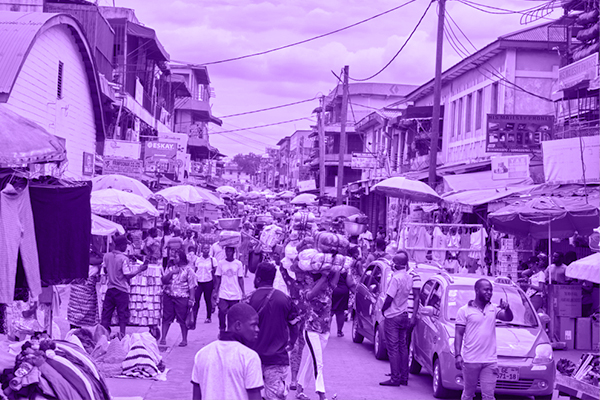Over the past three years, Ghanaians have faced significant economic hurdles, notably heightened by the pivotal Domestic Debt Exchange Programme (DDEP).
This event not only depleted citizens' savings, sparking concerns about pensions and banking stability but also echoed within the chambers of the Supreme Court, where a former Chief Justice voiced discontent with the government.
The burning question persists: are the current signs of stabilization a genuine turning point or just a brief relief? Ghanaians, ever-vigilant, are optimistic about real change in the months ahead.
With a presidential election looming within a year, the stakes are high for those seeking progress in Ghana. The current government grapples with restoring confidence in the economy and fulfilling promises, while the opposition NDC intensifies its campaign, capitalizing on voter dissatisfaction.
Rising inflation is a major concern for many Ghanaians, especially as prices surged in recent years. From June 2021, the inflation rate witnessed an almost exponential rise, reaching a concerning 54.1% in December 2022 – the highest in a decade.
The December 2023 inflation report from the Ghana Statistical Service highlighted a significant surge in the cost of 'Gob3,' everyone's favorite workday lunch, by 44.5% compared to December 2022. Additionally, research by Kobina Aidoo and Michael Armah revealed a 40.7% increase in the average selling price of kenkey in the market.
Their study, compiling a kenkey index from 30 to 40 spots around the Accra Metropolitan Area, emphasized a 17% decline in value measured by weight per Ghana cedi. Samples were collected within one week each calendar month, typically starting on the 15th day.
In response to economic challenges, the Bank of Ghana and the Ministry of Finance took decisive steps, including raising interest rates and adopting a stricter fiscal approach, supported by an initial injection of $600 million from the IMF.
The most recent report from the Ghana Statistical Service for December 2023 offers a glimmer of relief, indicating a slight easing of the inflation rate to 23.3% (Bank of Ghana targets 8%) after a year of gradual decline. However, this modest relief should not be misunderstood as a sign of declining prices.
The aftermath of the Domestic Debt Exchange Program (DDEP) significantly impacted banks, causing substantial losses to their balance sheets. According to research by Dr. Richmond Atuahene on the 2022 audited financial statements of banks, the 8 local banks that participated in the DDEP experienced a total impairment loss of GHS 8.6 billion.
Compounding the situation for banks, Bank of Ghana data reveals that non-performing loans reached an all-time high since 2020, with 1 out of every 5 loans being either unpaid or significantly overdue for interest or principal payments in August 2023.
In response to these challenges, banks opted to rebalance their portfolios by favoring short-term securities.
The Bank of Ghana's September 2023 Monetary Policy Report revealed a sharp increase in the share of Treasury bills (T-bills) from 17.8% in August 2022 to a significant 51.0% in August 2023. Conversely, the share of long-term securities in total investments saw a substantial decline, dropping from 81.9% to 48.8% over the same period.
Maintaining a consistently high growth rate is considered the key to success for any country, as highlighted by the late economist Robert Solow in his model.
Ghana experienced a positive trajectory in its quarterly growth rates post-COVID-19, concluding 2020 with a growth of 4.3% in Q4, followed by a notable improvement to 6.1% in Q4 of 2021. Despite minor fluctuations, the trend remained generally stable and upward.
However, the latest update from the Ghana Statistical Service for Q3 of 2023 reveals a growth rate of 2%, marking the lowest since Q2 and Q3 of 2020, which recorded -5.6% and -3.3%, respectively.
Excluding the tumultuous COVID-19 year, this represents the lowest growth since Q2 of 2016 when the growth rate was -2.5%. The recent dip signals a noteworthy deviation from the previously improving trend, prompting a closer examination of the economic factors at play.
Bank of Ghana's strategic initiatives, coupled with vital support from international partners, are yielding promising results.
The recent alleviation of inflation in December 2023 brings a sense of optimism, signaling the potential for a more stable economic landscape in the forthcoming months. The second infusion of $600 million from the IMF and an additional $300 million from the World Bank not only bolsters efforts to curb inflation but also breathes new life into the private sector.
As Ghana approaches the imminent presidential election, there exists a pivotal opportunity to channel focus towards economic policies fostering growth, inclusion, and sustainability.
The insights garnered from the challenges of recent years should serve as valuable lessons, guiding the formulation of robust economic strategies that propel the nation forward.
Latest Stories
-
CLOGSAG vows to resist partisan appointments in Civil, Local Government Service
41 minutes -
Peasant Farmers Association welcomes Mahama’s move to rename Agric Ministry
42 minutes -
NDC grateful to chiefs, people of Bono Region -Asiedu Nketia
45 minutes -
Ban on smoking in public: FDA engages food service establishments on compliance
45 minutes -
Mahama’s administration to consider opening Ghana’s Mission in Budapest
47 minutes -
GEPA commits to building robust systems that empower MSMEs
50 minutes -
Twifo Atti-Morkwa poultry farmers in distress due to high cost of feed
52 minutes -
Central Region PURC assures residents of constant water, power supply during yuletide
53 minutes -
Election victory not licence to misbehave – Police to youth
55 minutes -
GPL 2024/2025: Nations thrash struggling Legon Cities
57 minutes -
Electoral offences have no expiry date, accountability is inevitable – Fifi Kwetey
58 minutes -
Ghanaians to enjoy reliable electricity this Christmas – ECG promises
1 hour -
Police deny reports of election-related violence in Nsawam Adoagyiri
1 hour -
‘We’re not brothers; we’ll show you where power lies’ – Dafeamekpor to Afenyo-Markin
1 hour -
EPA says lead-based paints are dangerous to health, calls for safer alternatives
3 hours

